The best unofficial movie trilogies
The cinema landscape is awash with franchises and the movie trilogy has always been a favourite of filmmakers. But what about those writers and directors whose trifecta of films are connected not by specific plot points, but for more abstract, thematic reasons? Here are some of the best.
The Cornetto Trilogy – Simon Pegg & Edgar Wright
The films: ‘Shaun of the Dead’, ‘Hot Fuzz’, ‘The World’s End’
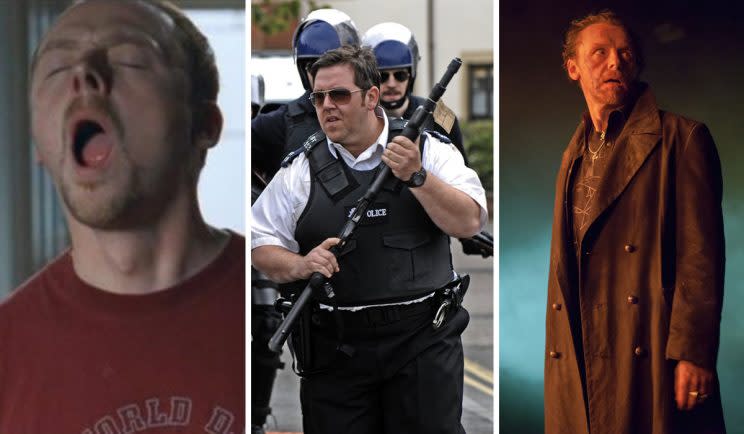
So named after the director jokily answered an interviewer’s question about the mention of the ice-cream in ‘Shaun’ and ‘Fuzz’ by saying it demonstrated how his films were like arthouse classics the “Three Colours…’ series, Pegg and Wright’s films are linked by the lead actors of course, but also by their sheer embrace of Britishness (nothing says Britain like a Cornetto, right?) as well the pair’s admission of how much of what we see is born out of their passion for action and/or horror movies from the 1970s to the 1990s (“Ever fired your gun in the air and yelled ‘aaarrggggh’?”).
‘Shaun’ features a red Cornetto illustrating blood and guts, ‘Hot Fuzz’ has blue, like the thin blue line of the police, while it’s green in alien comedy ‘The World’s End’, a nod to little green men. There are also plenty of other references to the earlier films as the trilogy progresses, like the ongoing gag about fences.
The Daughter Trilogy – Pete Docter & Pixar
The films: ‘Monsters, Inc.’, ‘Up’, ‘Inside Out’
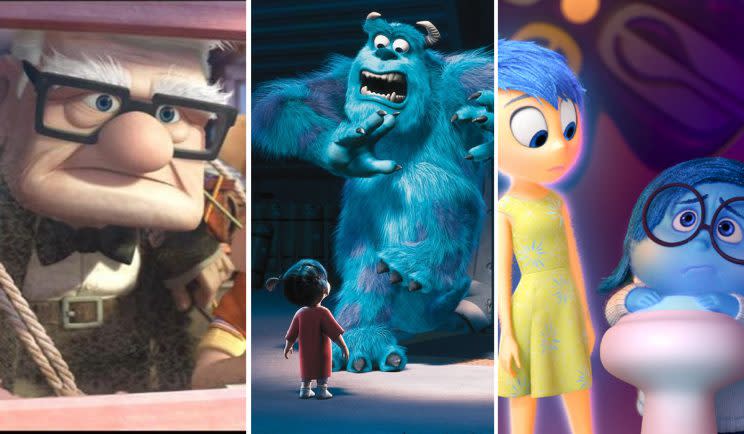
All three classics were inspired in some way by Pixar writer/director Docter’s relationship with his young child Elie. The first and last are more obvious – ‘Monsters, Inc.’ is about a child’s impact on the so-called scary beasts around her and how a youngster can change your life. No need to employ Freud for this one. Similarly, ‘Inside Out’ examines a young girl losing her innocence – a child growing up and dealing with volatile, grown-up emotions.
Most ludicrous parent-child age gaps in movies
How Norman Wisdom became Albania’s favourite film star
As producer Jonas Rivera told Yahoo, “There is nothing you can do as those days chip away and your kids grow up and that is really cool and great, but it is also a little tragic.”
As for ‘Up’? Well, Elie provided the voice of Carl’s late wife as a child and the character is called Ellie (with two Ls). Obviously Ellie’s death is one of the most tragic moments in any Pixar movie and one would think that Docter Sr wasn’t thinking about that kind of thing literally.
But how about this – before she dies as an old woman, Ellie writes in her Adventure Book that Carl needs to go and have another adventure. Any adults with mortgages and responsibilities can attest that maintaining your dreams amongst the mundanity of day-to-day life can be difficult. So maybe Docter is saying that it’s important to listen to your inner child and remind yourself constantly that you need to remember what’s really important in life?
The Vengeance Trilogy – Chan-wook Park
The films: ‘Sympathy for Mr Vengeance’, ‘Oldboy’, ‘Lady Vengeance’
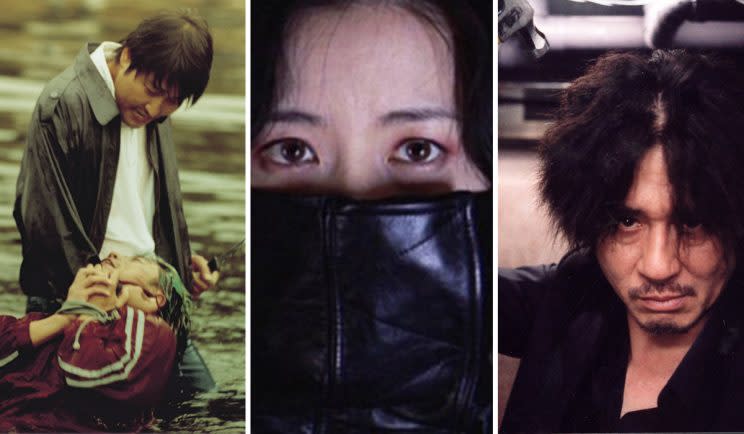
Visceral violence, characters seeking revenge, hell, Park’s nickname is Mr. Vengeance.
The Korean genius uses his films to challenge audiences. He’s previously said, “Living without hate for people is almost impossible…you can have that feeling, you just shouldn’t act on it.”
But this trifecta of brutal, poetic thrillers also throw up other important moral questions too, like when is violence justified and how people change when faced with unimaginable brutality.
However, Park is yet another filmmaker who says he actually owes his unofficial trilogy to journalists. Bombarded with questions about why he was making two similarly-themed films back-to-back, he has since explained, “Before I realised it, I’d announced that I wasn’t just making two, but three films on vengeance. It was actually just a spontaneous statement in an interview and I regretted it deeply, but I couldn’t take something back I said in public.”
The Spaghetti Westerns – Sergio Leone
The films: ‘A Fistful of Dollars’, ‘For a Few Dollars More’, ‘The Good, The Bad and the Ugly’
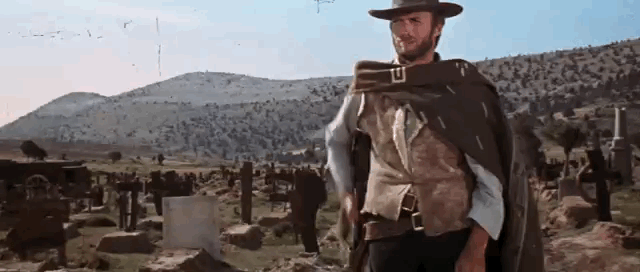
Some people are surprised to learn that while all three movies are of the same genre and follow the same actor (Clint Eastwood) playing The Man With No Name, they aren’t actually a traditional trilogy.
In fact, Clint is known by different names in each film – the idea that they were somehow connected was actually part of a marketing ploy by the distributor United Artists. And Lee Van Cleef plays two different characters in ‘For A Few Dollars More’ and ‘Ugly’.
The Vietnam Trilogy – Oliver Stone
The films: ‘Platoon’, ‘Born on the Fourth of July’, ‘Heaven and Earth’
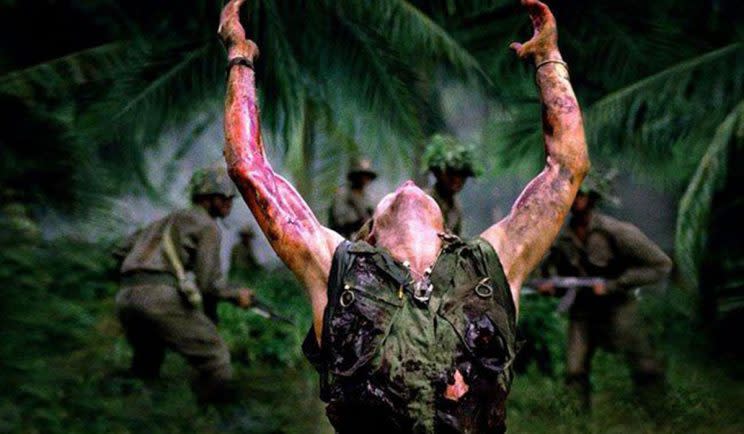
Like anyone who’s gone to war, Stone’s experience as a soldier during the Vietnam conflict has affected he’s ever done since. But none so starkly as this deeply personal, unflinching and one would hope cathartic trio of movies about the fighting, from a variety of different perspectives.
The Oscar-winning ‘Platoon’ is one of the greatest war movies ever made, witnessing the carnage from a young private’s point of view, while ‘Born on the Fourth of July’ – which tells the story of soldier-turned-paralysed campaigner Ron Kovic – features an unfairly forgotten acting tour-de-force by Tom Cruise who was Academy Award-nominated (Stone won Best Director for the second time).
The last in the trilogy switches sides, focusing primarily on a young Vietnamese woman who finds love with an American after suffering torture and rape under the communist regime before the scars of battle cause his self-destruction.
What connects all three aside of the carnage itself is the anti-war message and their illustration of the emotional damage it inflicts on its participants.
The Retro Crime Homage Trilogy – Quentin Tarantino
The Films: ‘Reservoir Dogs’, ‘Pulp Fiction’, ‘Jackie Brown’

We’re still waiting on the third part of Quentin’s revisionist history trilogy (‘Inglourious Basterds’, ‘Django Unchained’, ????), but the master filmmaker’s first three movies were already a triumvirate.
There’s the bleached-out visuals, the dialogue, the back-and-forth timelines and the soundtracks, sure. But ‘Dogs’ and ‘Pulp’ initially started out as two shorts written to be part of an anthology trilogy film, before being expanded into features of their own.
What’s more, they are all updated homages to film genres that Tarantino loved (and literally pinched from) – from gritty heist flicks like ‘The Killing’ and ‘The Taking of Pelham 123’, to Blaxploitation.
The Apocalypse Trilogy – John Carpenter
The films: ‘The Thing’, ‘Prince of Darkness’, ‘In the Mouth of Madness’

The name of the trilogy says it all, really. This is about the end of days in various forms and the writer/director admitted as much to the Wall Street Journal. ‘Prince of Darkness’ is literally about the rise of the Devil, ‘Madness’ finishes, without giving too many spoilers, with a bombastic kind of Armageddon. But it’s 1982 masterpiece ‘The Thing’ which illustrates Carpenter’s theme most subtly and most elegantly. We don’t see the end of the world – but in the quiet moment as Kurt Russell and Keith David sit waiting for one or the other to reveal themselves as the monster in the frozen wilderness, we know it’s coming. And that’s even more horrifying.
The Apartment Trilogy – Roman Polanski
The films: ‘Repulsion’, ‘Rosemary’s Baby’, ‘The Tenant’

These three classics by the controversial director are tied together by place. The claustrophobia of an apartment and its surrounding block mean different things depending on which film you’re watching. All three are scary psychological thrillers, all three speak to otherness, alienation and confusion over what’s real and what isn’t. Hell is other people (in particularly close proximity).
The Depression Trilogy – Lars Von Trier
The films: ‘Antichrist’, ‘Melancholia’, ‘Nymphomaniac’

Let’s face it, very little of the Danish auteur’s canon is what you would call upbeat. But these three divisive movies are perhaps the closest you’ll get to seeing the inside of Von Trier’s uniquely twisted mind, which he admits has been home to anxiety and subsequently depression. And there’s not much subtext to cut through here to see how that mental illness is reflected in his main characters. Whether it’s Kirsten Dunst’s apocalyptic ennui in ‘Melancholia’ or the furiously terrifying lovemaking between Willem Dafoe and Charlotte Gainsbourg in ‘Antichrist’ – a film in which depression literally manifests itself as disgusting or evil things – the director uses the cinematic canvas to work out his inner demons.
Read more
10 crazy reasons films got sued
10 films that got science really wrong

 Yahoo Movies
Yahoo Movies 
